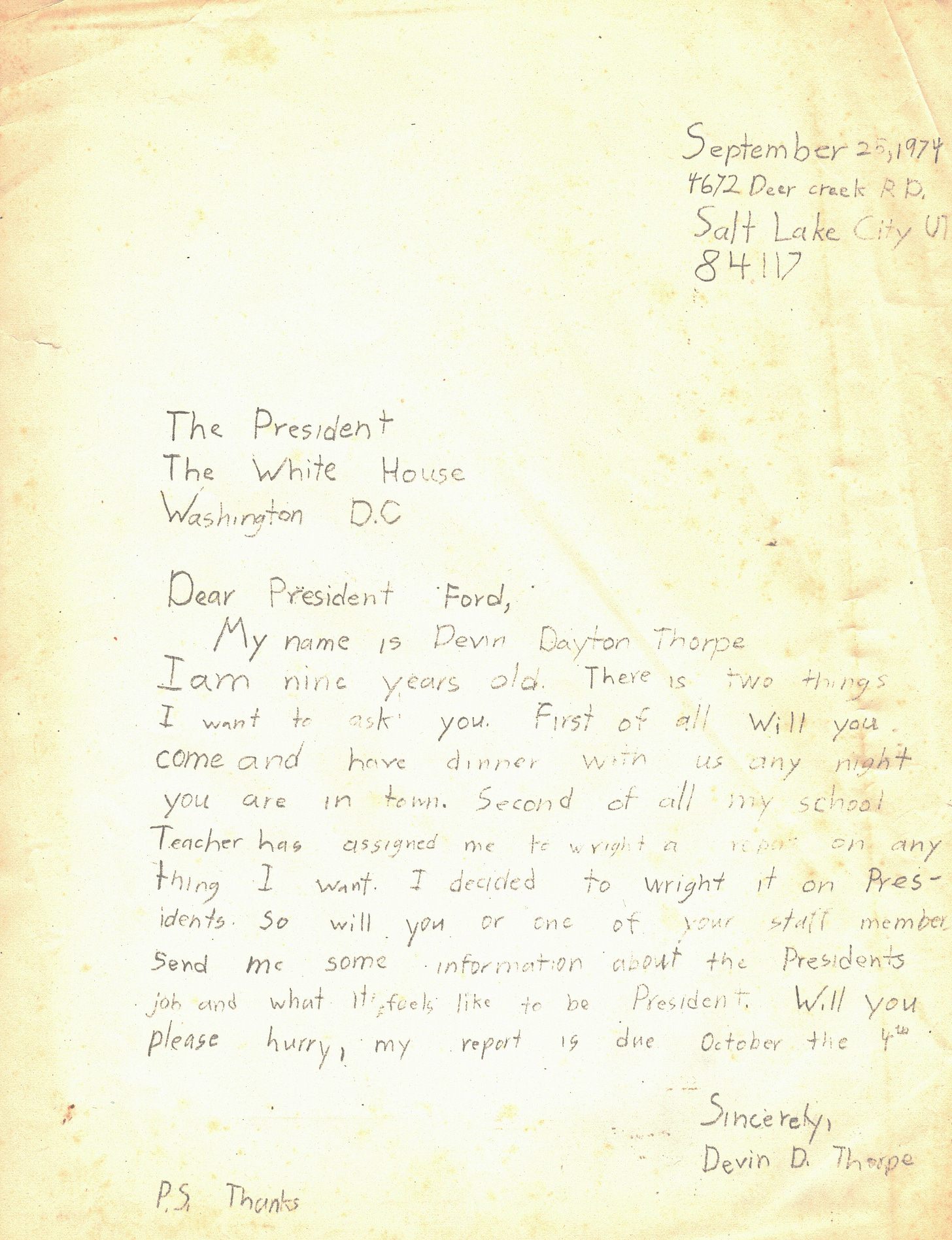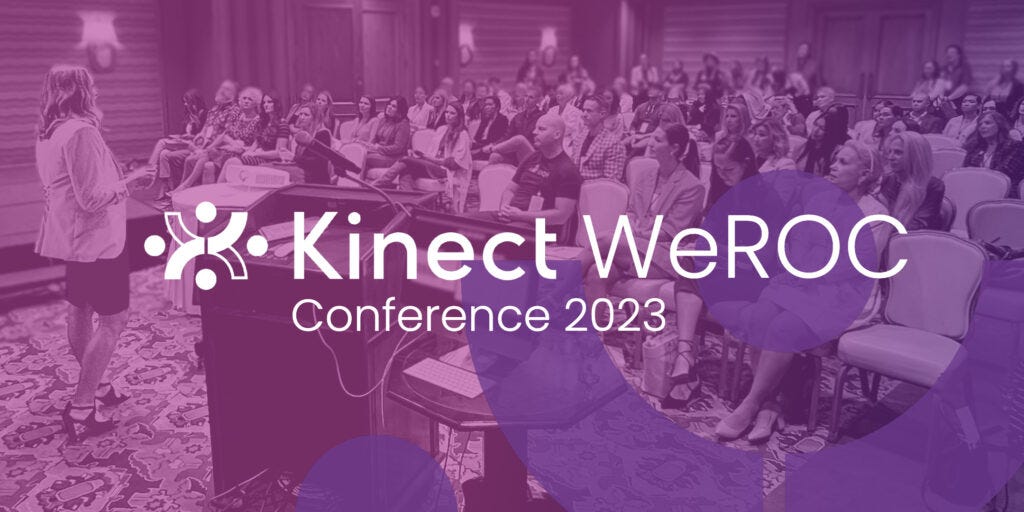My 1974 Note to President Gerald Ford
Hinting at a Lesson for Entrepreneurs a Long-Forgotten Note Surfaces in Cross-Country Move
Forgive me for reminiscing a bit with you. Gail and I just moved from Florida to California; in the process, we tripped over a few things we’d long since forgotten.
One item caught my attention. On September 25, 1974, at age nine, I wrote a letter to then-President Gerald Ford. My mother apparently made a photocopy (in 1974, that was kind of a big deal).
The letter reveals an extraordinary amount of naivete—typical of a nine-year-old kid. It occurs to me now that naivete is a bit of a superpower.
Honestly, I don’t remember clearly writing the letter or what went through my head as I did. I look at the letter now as you do with the objectivity of an observer. I do remember vaguely receiving a response from the White House. I couldn’t find that.
After introducing myself in the letter, I noted that I wished to ask for two things. “First of all Will you come and have dinner with us any night you are in town.”
(The letter reads like an ad for Grammarly. I remember thinking I was pretty smart; that is not reflected in this note.)
The President did not come to dinner.
“Second of all my school Teacher has assigned me to wright a paper on any thing I want. I decided to wright it on Presidents. So will you or one of your staff members Send me some information about the Presidents job and what it feels like to be President.”
I was careful to give him a deadline. “Will you please hurry, my report is due October the 4th.” Given the time for mail to make a round trip to DC from Salt Lake City in 1974, President Ford and his staff had about 24 hours to respond.
I remember vaguely that the response from the White House came late enough to moderately temper my excitement at receiving it—my deadline had passed.
If my report wasn’t better than my letter to President Ford, I shouldn’t have scored well.
Now, the key thing I note about the letter is its authenticity. It is pretty clear, my parents didn’t coach me, didn’t proofread or spell check the letter. I just wrote it and sent it. (Mom was at least involved enough to get a copy.)
Think about the audacity of a nine-year-old asking the President for help with his homework. Keep in mind that in 1974, no one outside of DARPA had heard of the internet, and few had ever seen a computer in person—forget use one. You didn’t Google, “What is it like to be the President?” If President Ford didn’t step up and send me the information I requested pronto, I’d be forced to look in the encyclopedia—or worse, go to the library.
Ultimately, I must have done something like that.
That naive audacity is like an entrepreneur’s initial vision of a world with a new enterprise in it. When someone says, in effect, “The world would be better if I started a business to solve this particular problem” and begins working to do it, they are deploying similar faith and optimism.
Between that moment of daring and building a successful business, the naivete must all be stripped away, replaced by sage advice and the experience we sometimes call failure. Entrepreneurs quickly learn that a team is absolutely essential.
But without that moment of naive audacity when an entrepreneur says, “I can do this,” many things we take for granted—Google included—might not exist.
For social entrepreneurs who approach the solution to a societal problem—whether it is climate change, social justice, poverty or global health—the need for a bit of exaggerated confidence may be even more important. The challenges will likely be greater—if solving a particular social problem were easy, the problem wouldn’t exist.
Entrepreneurs build on that weak scaffolding of hope and hubris, ultimately replacing it with the satisfaction of having done it.
In any case, I hope you’ll forgive this little trip down memory lane. As I said to President Ford, “P.S. Thanks”
Let’s get back to work solving the world’s big problems.
For the September SuperCrowdHour, I’m going to share some of the lessons I’ve learned from making dozens of crowdfunding investments and talking to hundreds of entrepreneurs and investors. You’ll learn not just how to make investments via crowdfunding but how to make money doing it.
Many impact crowdfunding investors focus on impact first. I admire the approach but note that a goal for maximizing impact is best accomplished by making money. It works two ways. A company that goes out of business has no impact after it dies. One that grows profitably can do unlimited amounts of good. Furthermore, if the investment delivers financial results to you, you can reinvest and do more good as an investor!
If you’re focused primarily on making money, you’ll find this session helpful, too. We’ll discuss maximizing financial returns. Don’t miss it!
Join us at the Kinect WeROC® Conference 2023 on Sep 5-6! Empower female CEOs, entrepreneurs, and founders as they scale their visions into reality. Be inspired, support, and invest in the Power of Her. Let's drive success together! Get your tickets now. #WeROC2023 #WomenInBusiness 💪🌟






I love it too Devin, and love the tie to our world today and the efforts we're engaged in to make important stuff better!
Best,
Chris
Love this letter, Devin. Naivety indeed, but a requirement for entrepreneurs, as least at some point in their journey...hopefully early! You and I are only a year apart in age, and humorously enough, I had a similar experience the year prior. I'd written my first report, also on Presidential matters...this one, however, was about my shining respect for President Nixon's efforts to open up China. A couple weeks later, I believe my opinion of Mr. Nixon may have changed. Great stuff, brother. Keep 'em comin'.